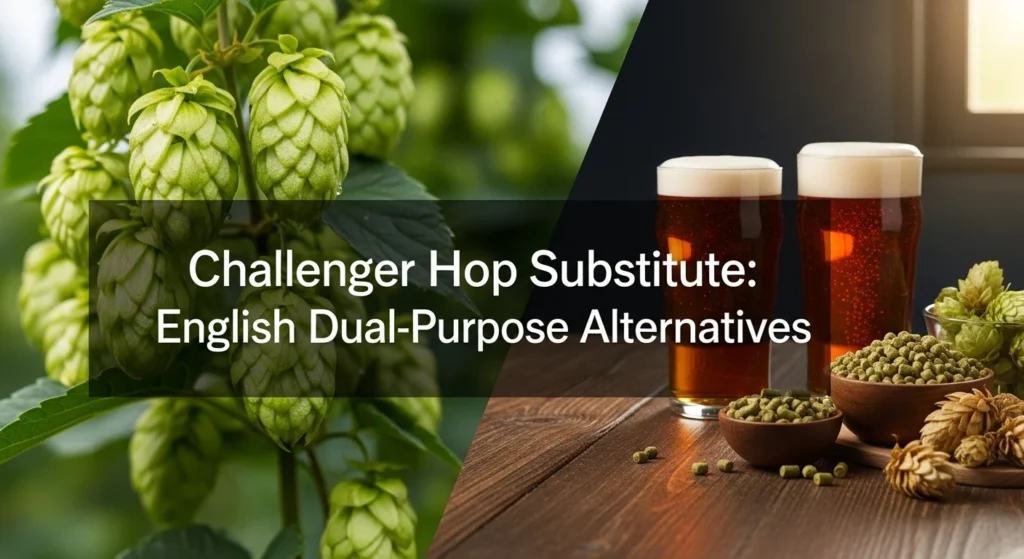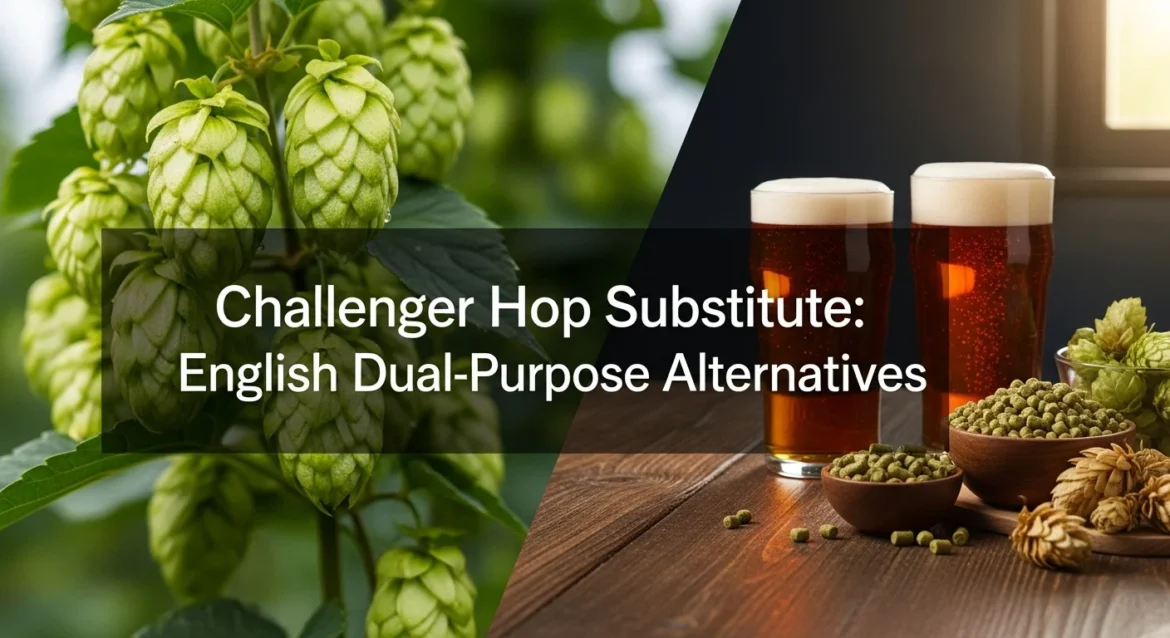Find the best Challenger hop substitutes with English dual-purpose character. Discover traditional and modern alternatives for bitters, ESBs, and English ales.

Planning that authentic English bitter with Challenger hops only to discover they’re sold out at your supplier? I’ve experienced that exact frustration more times than I care to count in my brewing career. This versatile English dual-purpose hop has become increasingly popular for craft beer brewing thanks to its balanced earthy-spicy-cedar character, creating demand that occasionally exceeds availability at local suppliers. The good news? Several English and European-grown hop varieties can replicate those distinctive earthy, spicy, and cedar notes that make Challenger essential for traditional British styles.
Finding the right Challenger hop substitute requires understanding what makes this hop special beyond just being English. It’s about capturing that distinctive combination of earthy complexity, spicy character, and subtle cedar-green tea notes with moderate alpha acids that created versatile dual-purpose brewing. After brewing with Challenger and testing various alternatives over the past decade, I’ve identified which substitutes actually deliver on their English promises and which fall disappointingly short when authentic British character matters.
This guide explores proven alternatives that maintain your beer’s intended flavor profile while respecting brewing traditions. Whether you’re brewing an English bitter, ESB, or traditional porter, you’ll find practical solutions that work.
Understanding Challenger’s Dual-Purpose Versatility
Challenger emerged in 1972 from Wye College breeding as cross of Northern Brewer with a Bavarian male hop. This dual-purpose hop delivers earthy, spicy, floral, cedar, and green tea characteristics with moderate alpha acids of 6.5-8.5%. What distinguishes Challenger from other English hops is its remarkably balanced dual-purpose nature combining reasonable bittering efficiency with distinctive aromatic character featuring unique cedar and green tea notes alongside traditional English earthiness.
The hop’s development represented English brewing’s response to demand for versatile dual-purpose hops that could serve bittering and aromatic roles. Challenger’s moderate alpha acids create efficient bittering while its refined earthy-spicy-cedar aromatics provide genuine English complexity when used in late additions where homebrewing equipment showcases delicate character.
When I first brewed with Challenger in a traditional English bitter seven years ago, the gentle earthy-spicy aroma with cedar backing created exactly the balanced British character I sought. That versatile, authentic quality is Challenger’s magic – English enough to honor tradition yet flexible enough for diverse applications.
Top Challenger Hop Substitute Options
Target: English High-Alpha Power
Target stands as a logical Challenger substitute for brewers seeking English character with higher bittering power. This English variety delivers earthy, herbal, sage, spicy, and English characteristics with higher alpha acids of 9-12.5% that provide more bittering efficiency.
Released from Wye College breeding in 1972 (same year as Challenger), Target shares similar English breeding heritage. While offering higher alpha acids and more pronounced sage-herbal character, Target’s English earthy-spicy nature creates powerful alternatives when higher bittering efficiency matters.
I’ve successfully substituted Target for Challenger in bitters and ESBs by using approximately 70-85% as much by weight to compensate for higher alpha acids. The beer’s character maintains English earthy-spicy nature while shifting toward more assertive sage-herbal rather than balanced cedar-spicy. Use Target when you want English character with increased bittering power from the Brewers Association standards.
East Kent Goldings: Traditional English Noble
East Kent Goldings brings earthy, herbal, honey, floral, and spicy characteristics with lower alpha acids of 4-6.5%. This legendary English variety provides refined noble character that complements Challenger’s English heritage.
Named after the East Kent region, East Kent Goldings represents traditional English brewing. While offering lower alpha acids and more refined character, Goldings’ classic earthy-honey-floral profile creates authentic English alternatives when traditional noble character matters more than dual-purpose versatility.
When substituting East Kent Goldings for Challenger, use approximately 25-40% more by weight to compensate for lower alpha acids. The beer’s character shifts toward traditional earthy-honey rather than earthy-cedar, creating classic English profiles suitable for traditional bitters and milds.
Northdown: English Earthy-Pine
Northdown delivers earthy, spicy, woody, pine, and English characteristics with moderate-high alpha acids of 7.5-9.5%. This English variety (Target’s parent) provides earthy-pine character similar to Challenger’s complexity.
Released from Wye College breeding, Northdown represents Challenger and Target’s genetic heritage. While offering higher alpha acids and more pronounced pine notes, Northdown’s earthy-spicy profile creates English alternatives with convenient alpha acid matching.
Use approximately 15-25% less Northdown by weight when substituting for Challenger to compensate for higher alpha acids. The beer maintains English earthy-spicy nature with pronounced woody-pine notes rather than cedar-green tea, creating traditional English profiles.
Perle: German Spicy-Floral
Perle offers spicy, floral, mint, green, and noble-like characteristics with moderate alpha acids of 7-9.5%. This German variety provides spicy-floral character that can approximate Challenger’s balanced nature with Continental terroir.
Developed in Germany from English Northern Brewer, Perle shares genetic connection to Challenger’s heritage. While lacking pure English character, Perle’s balanced spicy-floral-mint profile creates alternatives when dual-purpose versatility with noble-like character matters.
When substituting Perle for Challenger, use approximately equal weights thanks to similar alpha acids. The beer’s character shifts toward German spicy-floral-mint rather than English earthy-cedar, creating Continental alternatives suitable for lagers and German-style ales.
Northern Brewer: Woody-Mint Versatility
Northern Brewer brings woody, mint, earthy, and herbal characteristics with moderate alpha acids of 8-10%. This German-American variety (Challenger’s parent) provides versatile dual-purpose character with woody-minty complexity.
Developed in England in 1934 then cultivated widely in Germany and America, Northern Brewer shares direct genetic heritage with Challenger. The hop’s specific woody-mint character echoes some of Challenger’s complexity while emphasizing different flavor profiles.
Use approximately 15-25% less Northern Brewer by weight when substituting for Challenger to compensate for moderately higher alpha acids. The beer maintains dual-purpose versatility with woody-mint character rather than earthy-cedar, creating distinctive alternatives.
Fuggle: Classic English Earthy
Fuggle delivers earthy, woody, herbal, mild, and grassy characteristics with low alpha acids of 3.5-5.5%. This traditional English hop provides pure earthy-woody character that complements Challenger’s English heritage.
Named after breeder Richard Fuggle who developed it around 1875, Fuggle represents traditional English brewing alongside Goldings. While lacking Challenger’s dual-purpose efficiency, Fuggle’s classic earthy-woody profile creates authentic English alternatives when gentle traditional character matters.
When substituting Fuggle for Challenger, use approximately 40-60% more by weight to compensate for significantly lower alpha acids. The beer’s character emphasizes traditional earthy-woody rather than balanced earthy-cedar, creating classic English profiles.
Blending Strategies for Complete Substitution
The 60/40 English Blend
My most successful Challenger replacement combines 60% Northdown with 40% East Kent Goldings. This blend captures Northdown’s earthy-spicy bittering power while Goldings adds traditional honey-floral complexity approximating Challenger’s complete earthy-spicy-cedar profile. The combination creates more authentic English character than either hop alone.
Calculate your total hop bill first, then split according to this ratio for all additions. Use approximately equal total quantities to original Challenger amounts thanks to similar combined alpha acids while achieving balanced English dual-purpose character.
The High-Alpha Approach
For increased bittering efficiency, use Target alone for bittering additions (60 minutes) then add East Kent Goldings for late additions and dry hopping. This strategy maximizes bittering efficiency while preserving traditional English aromatics.
Use reduced Target quantities (approximately 70-80% of original Challenger amounts) for bittering, then match Challenger late addition quantities with Goldings for complete English profiles.
Single-Hop Simplicity
Sometimes simplicity wins. For straightforward beers where English dual-purpose character matters most, Northdown alone provides direct substitution at slightly reduced weights. The hop’s similar alpha acids and English nature make it ideal when convenient matching defines priorities.
For beers demanding traditional English character, East Kent Goldings by itself works beautifully despite requiring increased quantities. The hop’s legendary status creates compelling alternatives when authenticity matters more than efficiency.
Beer Style Considerations
English Bitters and ESBs
These classic British styles showcase dual-purpose English hops beautifully. Northdown or Target work exceptionally well as Challenger substitutes, providing balanced earthy-spicy character that defines traditional English brewing.
Use moderate hopping rates (1.25-2 oz per gallon total) with balanced bittering (30-45 IBUs) and generous late additions. Traditional English brewing demonstrates that versatile hops create complexity in session-strength styles.
English Porters and Stouts
Dark roasted styles benefit from Fuggle or Northern Brewer substitutions that provide earthy character complementing chocolate and coffee malt flavors without excessive hop flavor.
Use moderate hopping rates (0.75-1.5 oz per gallon total) allowing roasted malt character to remain prominent. Traditional English hopping creates classic porter and stout profiles where earthy hops integrate with roasted complexity.
Lagers and German Ales
Continental styles showcase Perle where spicy-floral character with moderate bittering creates German alternatives to English Challenger character.
Keep total hop rates moderate (1-1.75 oz per gallon) with balanced bittering (25-40 IBUs) and restrained late additions suitable for clean lager profiles.
Here is the comparison chart:
Challenger Hop Substitute Comparison Chart – Alpha Acids, Flavors, and Beer Style Compatibility
Timing Your Hop Additions for Dual-Purpose Character
Moderate Bittering (60 Minutes)
Challenger’s moderate alpha acids (6.5-8.5%) provide reasonable bittering efficiency for English styles. Use Challenger substitutes moderately at 60 minutes to establish baseline bitterness.
I typically use 0.75-1.5 oz per gallon at 60 minutes with Challenger substitutes to establish baseline bitterness around 30-45 IBUs appropriate for English bitters and ESBs. The moderate bittering creates balance characteristic of traditional British brewing.
Flavor Additions (15-20 Minutes)
This window captures dual-purpose character beautifully. All Challenger substitutes excel here, releasing earthy-spicy aromatics that integrate smoothly.
Add 0.5-1 oz per gallon at 15 minutes for traditional English styles. This timing extracts maximum flavor while preserving aromatics that define English brewing heritage.
Late Additions and Flameout
The final 5 minutes and flameout maximize earthy-spicy-cedar character while controlling bitterness. This technique suits all Challenger substitutes by preserving distinctive aromatics.
Use moderate quantities (0.25-0.75 oz per gallon) at flameout to add final aromatic layers. Traditional English brewing emphasizes late hop additions where refined character develops during conditioning.
Traditional English Dry Hopping
English cask ales traditionally employ dry hopping in casks. When dry hopping with Challenger substitutes, use restrained quantities (0.25-0.5 oz per gallon) for 3-5 days in secondary or cask.
Traditional English dry hopping creates subtle aromatic enhancement rather than modern American intensity. East Kent Goldings particularly suits cask dry hopping where gentle earthy-honey character develops.
Adjusting for Alpha Acids and Character
Understanding Challenger’s Moderate Profile
Challenger’s moderate alpha acids (6.5-8.5%) provide balanced dual-purpose versatility. Most substitutes have similar or different alpha acids requiring quantity adjustments.
Use this formula: (Challenger AA% ÷ Substitute AA%) × Original Amount = Substitute Amount. For example: (7.5% ÷ 10.5%) × 2 oz = 1.43 oz of Target needed to replace 2 oz of Challenger for equivalent bitterness.
Oil Content and Aromatic Complexity
Challenger’s moderate oil content creates distinctive earthy-cedar-green tea character. Substitutes with different oil compositions emphasize different flavors – Target provides sage-herbal, Northdown adds pine-woody, and East Kent Goldings contributes honey-earthy complexity.
Water Chemistry for English Expression
Burton-on-Trent High Sulfate
Classic English pale ales utilize Burton-on-Trent water profile featuring high sulfate (250-350 ppm) that accentuates hop character and creates crisp, dry finishes.
For Challenger substitutes in English bitters and ESBs, replicate Burton profile with appropriate mineral additions. The high sulfate brings forward English hop character while creating dry finishes that define traditional British brewing.
Balanced London Water
For darker styles like porters and stouts, balanced London water profile with moderate sulfate (100-150 ppm) and chloride (50-75 ppm) creates smoother character that complements roasted malt.
Yeast Strain Synergies
English Ale Yeast Character
For authentic English ales, traditional English ale yeasts (WLP002/S-04, WLP007) create characteristic fruity esters that enhance rather than compete with earthy hop character.
Ferment at moderate temperatures (65-68°F) to encourage balanced ester production. The moderate fruit character complements rather than overwhelms earthy-spicy English hop aromatics.
Clean American Ale Yeast
For cleaner interpretations, neutral American yeasts (WLP001/US-05) provide clean canvases where hop character dominates without yeast interference.
Ferment at moderate temperatures (66-68°F) to minimize yeast-derived flavors.
Sourcing and Availability
Challenger Accessibility
Challenger enjoys moderate availability through English hop suppliers and specialty importers. When available, expect moderate-premium pricing ($14-20 per pound) for imported English hops.
The hop’s dual-purpose versatility maintains steady demand among brewers crafting traditional English styles.
Substitute Availability
Target and Northdown stock moderately through English hop specialists. East Kent Goldings and Fuggle face varying availability as traditional lower-yield varieties. Perle maintains good availability through German hop suppliers. Northern Brewer stocks reliably through diverse suppliers given multi-region cultivation. Expect premium pricing for English varieties and moderate pricing for Continental and American-grown alternatives.
Storage Best Practices
Store all hops in oxygen-barrier bags in your freezer at 0°F or below. English hops’ delicate aromatics are vulnerable to oxidation and should be used within 6-9 months for peak earthy-spicy-cedar character.
Common Substitution Mistakes
Using Bold American Hops
Substituting Challenger with aggressive American citrus hops completely misses English character. English hop substitution requires English or English-like varieties emphasizing earthy-spicy rather than citrus-pine.
Wrong Alpha Acid Calculations
Failing to adjust quantities when using different alpha acid substitutes creates incorrect bitterness. Always calculate based on alpha acid ratios.
Over-Hopping Traditional Styles
Applying modern American hopping rates to traditional English styles creates inappropriate hop-bomb character. Traditional brewing demonstrates that moderation creates balance.
Frequently Asked Questions
What is the closest substitute for Challenger hops?
Northdown provides closest overall match with similar moderate-high alpha acids (7.5-9.5%) and English earthy-spicy character, though with more pronounced pine notes. Target offers English alternative with higher alpha acids (9-12.5%) requiring reduced quantities. Blend 60% Northdown with 40% East Kent Goldings for most complete earthy-spicy-floral substitution maintaining English authenticity.
Can I use just one hop instead of Challenger?
Yes, single-hop substitutions work well in English styles. Northdown excels in bitters and ESBs with convenient alpha acid matching. Target suits styles needing higher bittering power. East Kent Goldings works in traditional ales emphasizing refined noble character. Perle adapts to Continental styles. Choose based on desired alpha acids and character emphasis.
How much substitute hop should I use compared to Challenger?
For Northdown (8.5% AA) replacing Challenger (7.5% AA), use approximately 0.88× the amount for equivalent bitterness. For Target (10.5% AA), use about 0.71× original amounts. For East Kent Goldings (5.5% AA), use roughly 1.36× Challenger quantities. Adjust based on specific alpha acid percentages.
Do these substitutes work in all beer styles?
Challenger substitutes adapt well across English and Continental styles. Northdown, Target, and Fuggle suit English bitters, ESBs, and porters. Perle works in lagers and German ales. Northern Brewer adapts to diverse applications. Avoid using English hops in aggressive American IPAs where refined character gets overwhelmed.
When should I add these hops during brewing?
Use moderate bittering additions (0.75-1.5 oz per gallon at 60 minutes) establishing balanced bitterness (30-45 IBUs). Substantial flavor additions (0.5-1 oz per gallon at 15 minutes) add earthy-spicy character. Moderate late additions (0.25-0.75 oz per gallon at flameout) maximize aromatics. Limited dry hopping (0.25-0.5 oz per gallon for 3-5 days) maintains authentic English character.
Will my beer taste exactly the same with substitutes?
No substitute perfectly replicates Challenger’s exact earthy-spicy-cedar combination with balanced dual-purpose versatility, but well-chosen alternatives create equally authentic English character. Northdown emphasizes earthy-pine, Target adds sage-herbal, and East Kent Goldings provides honey-earthy complexity maintaining British brewing authenticity.
Where can I buy these substitute hops?
Specialty suppliers focusing on English hops stock Challenger substitutes with varying availability. Major online suppliers like Yakima Valley Hops, Northern Brewer, and BSG Craft Brewing carry some English varieties alongside Continental alternatives. English varieties face sporadic availability requiring advance planning and relationships with specialty importers.
How should I store substitute hops?
Store all hops in oxygen-barrier packaging (vacuum-sealed mylar bags) in freezer at 0°F or below. English hop aromatics maintain quality for 6-9 months frozen, with subtle earthy-cedar notes fading faster than bold American citrus. Use freshest hops for late additions where English character matters most.
Making Your Final Choice
Selecting the perfect Challenger hop substitute depends on your beer style, desired English authenticity, and hop availability. Northdown offers most convenient matching for brewers seeking English character in bitters and ESBs where moderate-high alpha acids with earthy-spicy nature define the beer.
Target provides powerful English alternative for brewers seeking increased bittering efficiency while maintaining British character. Its assertive sage-herbal nature creates compelling substitutions when higher alpha acids matter.
East Kent Goldings delivers traditional English noble for brewers prioritizing refined authentic character over dual-purpose efficiency. Its legendary status works beautifully when classic English brewing heritage matters most.
Remember that exceptional traditional beer comes from respecting brewing heritage while adapting practically to ingredient availability. Challenger substitutions honor English traditions while acknowledging modern realities of hop sourcing.
Don’t be afraid to blend English varieties for complete character, use Target for increased efficiency, or embrace Continental Perle when German alternatives suit your brewing. The brewing community continues proving that thoughtful substitution creates authentic results.
Whether you’re crafting a traditional English bitter, balanced ESB, or refined porter, these Challenger substitutes will help you create exceptional beer that captures English earthy-spicy-cedar character. Trust proper calculations, brew with balanced hopping rates, and embrace the versatile dual-purpose nature that makes English brewing so distinctive and rewarding.
About the Author
Lisa Fermenta is a certified nutritionist and fermentation expert who explores the health benefits of probiotic beverages. Her journey began in her grandmother’s kitchen, where she learned traditional fermentation techniques that have been passed down for generations. Lisa has studied with fermentation masters across Asia and Europe, bringing global perspectives to her brewing approach. She regularly conducts workshops on kombucha, kefir, and other fermented drinks, emphasizing both flavor development and health benefits. When not experimenting with fermented beverages, Lisa enjoys maintaining her SCOBY library containing over 30 unique cultures from around the world. Connect with her on Instagram for fermentation insights and probiotic beverage tips.

